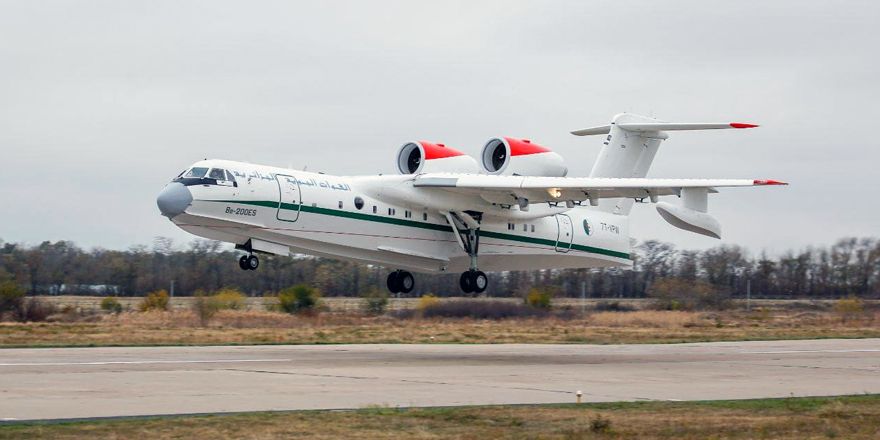Like many Mediterranean countries, Algeria is grappling with forest fires. In recent years, dozens of lives have been lost, and thousands of hectares of vegetation have been destroyed by the flames. In response, Algerian authorities have decided to rethink their firefighting strategy by incorporating aerial resources.
On August 17, 2022, multiple wildfires broke out in El Tarf, a border region with Tunisia. Fueled by strong sea breezes, towering flames quickly spread across hills blanketed with pine and cork oak trees. Within hours, more than 6,000 hectares were reduced to ashes. The blaze, one of the most devastating in decades in eastern Algeria, claimed 38 lives. Several victims, trapped in an outdoor amusement park, had no chance of escape as the flames spread with alarming speed.
For the past decade, Algeria has faced deadly wildfires every summer. The summer of 2021 was the most catastrophic, with the highest toll in both human lives and forest destruction. Between July and August, fires erupted in 35 wilayas (provinces), particularly in the Aurès and Kabylie regions, killing more than 90 people. In total, 89,000 hectares of forest were lost to blazes that authorities classified as "criminal in origin." In response to the tragedy, the Algerian president declared a three-day national mourning period.
Change in firefighting strategy
The sharp rise in temperatures and prolonged droughts caused by climate change have undeniably fueled the surge in forest fires. The devastating wildfires of 2021 and 2022 forced Algerian authorities to completely rethink their firefighting strategy.
For decades, Algerian firefighters have relied on all-terrain fire trucks designed for deployment in mountainous regions. However, these vehicles have proven inadequate in battling large-scale blazes. The same limitations apply to the country's fleet of six Agusta-Westland AW139 helicopters, which are effective only in tackling initial fire outbreaks.
Given the evolving threat, authorities have turned to aerial firefighting resources such as Canadair water bombers. Akram Kharief, a security affairs journalist and director of the Menadefense website, explains that Algeria first sought foreign assistance during the summer of 2021. “Countries like France and Russia deployed water bomber planes to combat the major fires in northern Algeria. This experience ultimately convinced authorities of the effectiveness of aerial firefighting,” he notes.
The choice of Russian aircraft
The Algerian government has opted for the Beriev Be-200, tasking the Ministry of National Defense with ordering six units from the Russian manufacturer.
"The Beriev is particularly well-suited to Algeria’s needs for several reasons," explains a defense expert. "As a seaplane, it can be stationed at a dock, and the Algerian army plans to build a launch ramp at the port of Béjaïa, allowing the aircraft to take off fully loaded with water. Designed for maritime operations, it is highly resistant to corrosion—a key advantage since it draws seawater to combat wildfires. Its carrying capacity is also double that of a Canadair."
Beyond firefighting, the Beriev Be-200 is a versatile aircraft that can be converted for passenger transport, cargo operations, or maritime patrol missions, making it a strategic asset for Algeria’s aerial fleet.
Proven effectiveness
The Algerian army received its first Beriev Be-200 in May 2023, allowing for its deployment as early as the first heatwaves. Despite 34 fatalities recorded in July, the summer’s toll was significantly reduced compared to previous years, with a notable decrease in the amount of forest lost to fire. The use of aerial firefighting resources has played a crucial role in preventing many blazes.
The impact is clear: Algeria saw a dramatic drop in burned forest areas, from 81,000 hectares in 2021 to just 3,484 hectares in 2024. Speaking on public radio, Abdelghani Boumessoud, Inspector General at the General Directorate of Forests (DGF), described 2024 as "the best year for firefighting efforts since Algeria's independence." The introduction of aerial firefighting has proven highly effective, thanks to the Beriev's intervention and the activation of six Air Tractors—small water bombers originally designed for agricultural use. Acquired by a subsidiary of Tassili Airlines, a public carrier owned by Algerian oil giant Sonatrach, these U.S.-made aircraft, with a capacity of 3,000 liters of water or fire retardant, have shown their effectiveness in controlling wildfire outbreaks, explains security analyst Akram Kharief.
The Algerian army took delivery of its second Russian-built water bomber in December 2024, with the remaining four set to arrive within the next two years. As the government embarks on an ambitious reforestation program—aiming to plant 423 million trees across 520,000 hectares—strategically deploying these firefighting aircraft along the Mediterranean coast and the high plateaus has become even more critical.

Featured Photo: A family from the village of Toudja affected by the fires in July 2023 ©Billel Bensalem, Algeria Presse Photo (APP)
